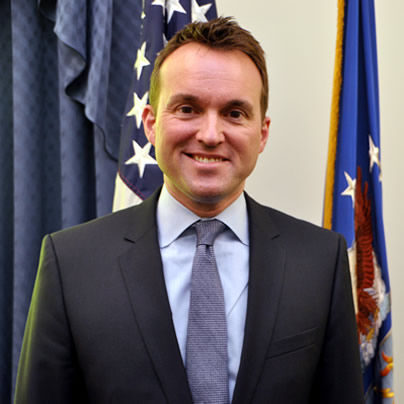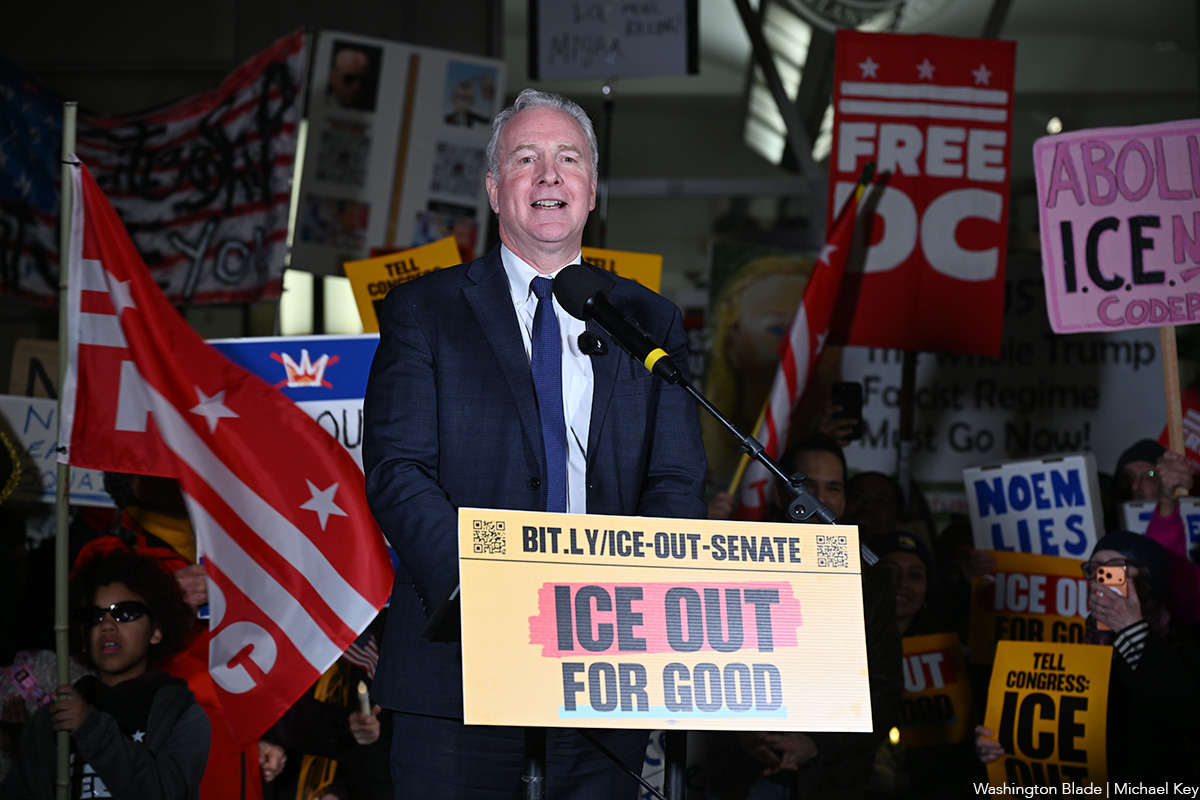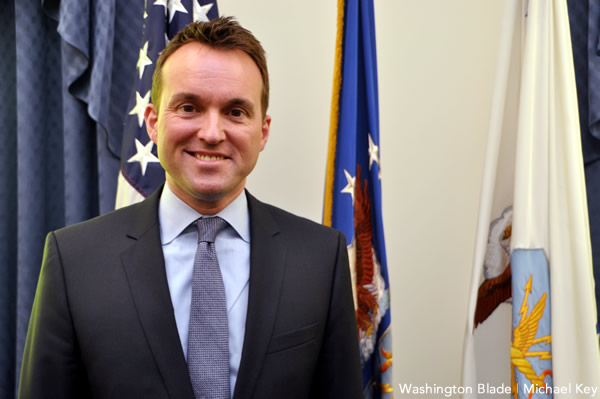Politics
Soaring at the Air Force
Under Secretary Fanning on his career and vision for an LGBT-inclusive military

After being bitten by the politics bug in 1988, a gay Dartmouth college student would abandon plans to pursue a career in architecture and instead move to D.C. where, years later, he would ascend the ranks to take on the second-highest civilian position in the U.S. Air Force.
It was the New Hampshire primary after eight years of Ronald Reagan that led Eric Fanning to shift his career trajectory to politics and policy.
“The campaign hooked me on politics. I found my way into an internship on the Hill and decided I wanted to come back,” Fanning said. “I got a great job on the House Armed Services Committee, which is not easy to do. I was very lucky to get that. The chairman of the committee, for whom I was research assistant, was, within 16 months, Clinton’s first defense secretary, so I was over here in the Clinton Pentagon. The path kind of wrote itself very early on.”
Fanning, 44, reflected on his career path and vision for an LGBT-inclusive Air Force during an interview with the Washington Blade in his office at the Pentagon on Wednesday — the first media interview he’s granted since the U.S. Senate confirmed him last month as under secretary of the Air Force by voice vote.
After his initial work on Capitol Hill, Fanning worked as special assistant to the Secretary of Defense, and associate director of political affairs at the White House. During the Bush administration, he worked for Business Executives for National Security, a D.C.-based think tank before joining the Commission on the Prevention of Weapons of Mass Destruction Proliferation & Terrorism.
Once President Obama assumed office, Fanning went to work as Deputy Chief Management Officer for the Department of the Navy and continued in that role until he was nominated in July for his role as Air Force under secretary. In that role as part of Air Force leadership, Fanning is responsible for affairs on behalf of the secretary of the Air Force, including organizing, training and equipping the service. Fanning, who’s single, lives in Logan Circle and works at the Pentagon.
Throughout his service in the government, Fanning has witnessed the enactment of “Don’t Ask, Don’t Tell” in 1993 as well as the ban on openly gay service members being lifted after President Obama signed repeal legislation in December 2010.
“‘Don’t Ask, Don’t Tell was implemented when I got here,'” Fanning said. “That wasn’t a particularly fun experience listening to the senior generals and admirals talk about those issues — now it was 20-plus years ago. It made this last round more rewarding just to see the change in the attitudes in the senior uniform leadership.”
Although he said he’s never felt like he’s been discriminated against while working at the Pentagon, Fanning said working for an institution that would have discharged him for being openly gay if he had served on the uniform side was “challenging” and he was on pins and needles as legislation to repeal the law met obstacles in Congress.
“I left the Pentagon before the re-election and then didn’t come back until this administration when we had a president who said he was going to end it,” Fanning said. “It was very difficult when we were getting to the end of the first two years and it wasn’t clear if we were going to be able to repeal ‘Don’t Ask, Don’t Tell.’ I didn’t know what I was going to do if we didn’t get the repeal through because some people couldn’t work because they were openly gay or lesbian.”
Fanning isn’t a stranger to LGBT advocacy work. From 2004 to 2007, he served on the board of the Gay & Lesbian Victory Fund. Fanning said he’s limited in the degree to which he can take part in LGBT organizations, but does contribute to pro-LGBT causes. Among them was a recent donation to Scouts for Equality, the organization the led the way for the Boy Scouts to approve a resolution ending its ban on gay youth.
“I think those organizations are important,” Fanning said. “It’s one of the reasons I gave so much time to the Victory Fund. But I don’t think there’s anything as important as just living an open life of integrity and productivity. … The more of us that are out and just doing the normal course of work of what we do as brothers, sisters, sons, colleagues, neighbors, I think that’s one of the most important things we can do.”
Chuck Wolfe, CEO of the Victory Fund, said Fanning represents what LGBT Americans can achieve and said his new role in the Air Force appropriately fits someone who helped elect LGBT people as a Victory Fund board member.
“Eric’s appointment is another positive step for LGBT Americans, who have begun to reject the idea that authenticity and public service are incompatible,” Wolfe said. “As a Victory Fund board member, Eric worked to make it possible for talented, committed leaders to serve the public regardless of their sexual orientation or gender identity. It’s fitting that he has now become a high-profile example of that mission.”
Like many gay Americans, Fanning said he’s closely monitoring the proceedings at the Supreme Court on two prominent gay rights cases: one challenging California’s Proposition 8, the other challenging the Defense of Marriage Act. Fanning said the case against DOMA is also professionally important to him because that law precludes major partner benefits — including health and pension benefits — from flowing to service members with same-sex partners.
“It has a significant impact on the Department of Defense as well because so many of these benefits conversations are tied up with DOMA, which is a federal law that we have to follow,” Fanning said. “In some ways, DOMA, which I think is a terrible law, made the repeal of ‘Don’t Ask, Don’t Tell’ easier because it took some of the more emotional issues off the table, but in terms of extending benefits, I think everyone who serves in uniform should have full access to legal benefits, and so, DOMA is the main roadblock to that.”
Fanning also takes the helm of the Air Force after an announcement in February that the Pentagon would extend to service members with same-sex partners limited benefits that are available to them under DOMA. Most of these benefits are the result of issuing these partners military IDs so they have access to commissaries and other programs. The goal to implement these is by by Aug. 31, but no later than Oct. 1.
“When we deploy airmen in this case, they need to know their families are being taken care of when they’re back home,” Fanning said. “The families are involved in deployments; we’re taking families away for extended periods of time. So, I think extending those types of benefits to people who are serving in uniform, volunteered for those risks is very important. So, I’m glad to see that it’s going forward.”
With the process leading to those benefits underway, Fanning also said he supports other outstanding initiatives sought by advocates — in particular the LGBT military group OutServe-SLDN — on behalf of LGBT service members while emphasizing he was speaking in a personal capacity in support of those ideas.
One of them was an explicit non-discrimination policy on sexual orientation in the military that would protect gay service members who feel they’re suffering discrimination or harassment. Currently, service members have no recourse for anti-gay discrimination outside of their chain of command. In respect to calls for an explicit non-discrimination policy, the Pentagon has consistently said it treats all service members with respect without committing to a new policy.
“Speaking personally, I always think it’s important to have non-discrimination policies codified to include everyone,” Fanning said. “The military, because it has a chain of command, has a different attitude about this and a different way to try to go about protecting airmen, sailors, soldiers, Marines — but Eric Fanning? Yes. I personally like to see these things in writing and codified.”
While some advocates have said President Obama should issue a non-discrimination executive order to protect gay service members, OutServe-SLDN has shifted its focus to calling on Defense Secretary Chuck Hagel to include out service members in non-discrimination and anti-harassment protections. Fanning said his preference is for the policy to originate from the Pentagon.
“My view about government is you should always use those resources that are available to you first before you move up to the next level, so I think there are a number of things we can do inside this building for the Department of Defense,” Fanning said. “If the president wanted to do that for the government at large, that’s a different issue, but we have the ability within the Department of Defense to codify this without having the president issue an executive order.”
Fanning also said he backs the idea of openly transgender service in the military. Currently, openly transgender people are unable to serve in the armed forces and face a medical discharge if their gender identity becomes known.
“I think that the military is stronger, institutions are stronger, and society is stronger the more inclusive that we are,” Fanning said. “So, wherever we can root out discrimination, I think it’s a positive thing.”
Allyson Robinson, executive director of OutServe-SLDN, praised Fanning for expressing support for the initiatives and said his vision for the military brings the institution into alignment with the 21st century.
“Under Secretary Fanning shares the same vision we have at OutServe-SLDN: a U.S. military that leads the nation in LGBT inclusion rather than lagging behind it,” Robinson said. “The steps he’s suggested would bring our armed forces in line with proven best inclusion practices of some of America’s most effective organizations, including our largest defense contractors, and of some of our strongest allies, like Great Britain and Israel. It’s encouraging to see this kind of forward thinking from one of our top military leaders.”
Congress
McBride, other US lawmakers travel to Denmark
Trump’s demand for Greenland’s annexation overshadowed trip

Delaware Congresswoman Sarah McBride is among the 11 members of Congress who traveled to Denmark over the past weekend amid President Donald Trump’s continued calls for the U.S. to take control of Greenland.
McBride, the first openly transgender person elected to Congress, traveled to Copenhagen, the Danish capital, with U.S. Sens. Chris Coons (D-Del.), Thom Tillis (R-N.C.), Jeanne Shaheen (D-N.H.), Dick Durbin (D-Ill.), and Lisa Murkowski (R-Alaska) and U.S. Reps. Steny Hoyer (D-Md.), Gregory Meeks (D-N.Y.), Madeleine Dean (D-Pa.), Don Bacon (R-Neb.), and Sarah Jacobs (D-Calif.). The lawmakers met with Danish Prime Minister Mette Frederiksen and Greenlandic MP Pipaluk Lynge, among others.
“I’m grateful to Sen. Coons for his leadership in bringing together a bipartisan, bicameral delegation to reaffirm our support in Congress for our NATO ally, Denmark,” said McBride in a press release that detailed the trip. “Delaware understands that our security and prosperity depend on strong partnerships rooted in mutual respect, sovereignty, and self-determination. At a time of growing global instability, this trip could not be more poignant.”
Greenland is a self-governing territory of Denmark with a population of less than 60,000 people. Trump maintains the U.S. needs to control the mineral-rich island in the Arctic Ocean between Europe and North America because of national security.
The Associated Press notes thousands of people on Saturday in Nuuk, the Greenlandic capital, protested against Trump. British Prime Minister Keir Starmer is among those who have criticized Trump over his suggestion the U.S. would impose tariffs against countries that do not support U.S. annexation of Greenland.
A poll that Sermitsiaq, a Greenlandic newspaper, and Berlingske, a Danish newspaper, commissioned last January indicates 85 percent do not want Greenland to become part of the U.S. The pro-independence Demokraatit party won parliamentary elections that took place on March 12, 2025.
“At this critical juncture for our countries, our message was clear as members of Congress: we value the U.S.-Denmark partnership, the NATO alliance, and the right of Greenlanders to self-determination,” said McBride on Sunday in a Facebook post that contained pictures of her and her fellow lawmakers meeting with their Danish and Greenlandic counterparts.
Congress
Van Hollen speaks at ‘ICE Out for Good’ protest in D.C.
ICE agent killed Renee Nicole Good in Minneapolis on Jan. 7

U.S. Sen. Chris Van Hollen (D-Md.) is among those who spoke at an “ICE Out for Good” protest that took place outside U.S. Customs and Border Protection’s headquarters in D.C. on Tuesday.
The protest took place six days after a U.S. Immigration and Customs Enforcement agent shot and killed Renee Nicole Good, a 37-year-old woman in Minneapolis.
Good left behind her wife and three children.
(Video by Michael K. Lavers)
Congress
Advocates say MTG bill threatens trans youth, families, and doctors
The “Protect Children’s Innocence” Act passed in the House

Georgia Congresswoman Marjorie Taylor Greene has a long history of targeting the transgender community as part of her political agenda. Now, after announcing her resignation from the U.S. House of Representatives, attempting to take away trans rights may be the last thing she does in her official capacity.
The proposed legislation, dubbed “Protect Children’s Innocence Act” is among the most extreme anti-trans measures to move through Congress. It would put doctors in jail for up to 10 years if they provide gender-affirming care to minors — including prescribing hormone replacement therapy to adolescents or puberty blockers to younger children. The bill also aims to halt gender-affirming surgeries for minors, though those procedures are rare.
Greene herself described the bill on X, saying if passed, “it would make it a Class C felony to trans a child under 18.”
According to KFF, a nonpartisan source for health policy research, polling, and journalism, 27 states have enacted policies limiting youth access to gender-affirming care. Roughly half of all trans youth ages 13–17 live in a state with such restrictions, and 24 states impose professional or legal penalties on health care practitioners who provide that care.
Greene has repeatedly introduced the bill since 2021, the year she entered Congress, but it failed to advance. Now, in exchange for her support for the National Defense Authorization Act, the legislation reached the House floor for the first time.
According to the 19th, U.S. Rep. Sarah McBride (D-Del.), the first trans member of Congress, rebuked Republicans on the Capitol steps Wednesday for advancing anti-trans legislation while allowing Affordable Care Act tax credits to expire — a move expected to raise health care costs for millions of Americans.
“They would rather have us focus in and debate a misunderstood and vulnerable one percent of the population, instead of focusing in on the fact that they are raiding everyone’s health care,” McBride said. “They are obsessed with trans people … they are consumed with this.”
Polling suggests the public largely opposes criminalizing gender-affirming care.
A recent survey by the Human Rights Campaign and Global Strategy Group found that 73 percent of voters in U.S. House battleground districts oppose laws that would jail doctors or parents for providing transition-related care. Additionally, 77 percent oppose forcing trans people off medically recommended medication. Nearly seven in 10 Americans said politicians are not informed enough to make decisions about medical care for trans youth.
The bill passed the House and now heads to the U.S. Senate for further consideration.
According to reporting by Erin Reed of Erin In The Morning, three Democrats — U.S. Reps. Henry Cuellar and Vicente Gonzalez of Texas and Don Davis of North Carolina — crossed party lines to vote in favor of the felony ban, joining 213 Republicans. A total of 207 Democrats voted against the bill, while three lawmakers from both parties abstained.
Advocates and lawmakers warned the bill is dangerous and unprecedented during a multi-organizational press call Tuesday. Leaders from the Human Rights Campaign and the Trevor Project joined U.S. Rep. Becca Balint (D-Vt.), Dr. Kenneth Haller, and parents of trans youth to discuss the potential impact of restrictive policies like Greene’s — particularly in contrast to President Donald Trump’s leniency toward certain criminals, with more than 1,500 pardons issued this year.
“Our MAGA GOP government has pardoned drug traffickers. They’ve pardoned people who tried to overthrow the government on January 6, but now they want to put pediatricians and parents into a jail cell for caring for their kids,” said Human Rights Campaign President Kelley Robinson. “No one asked for Marjorie Taylor Greene or Dan Crenshaw or any politician to be in their doctor’s office, and they should mind their own business.”
Balint, co-chair of the Congressional Equality Caucus, questioned why medical decisions are being made by lawmakers with no clinical expertise.
“Parents and doctors already have to worry about state laws banning care for their kids, and this bill would introduce the risk of federal criminal prosecution,” Balint said. “We’re talking about jail time. We’re talking about locking people up for basic medical care, care that is evidence-based, age-appropriate and life-saving.”
“These are decisions that should be made by doctors and parents and those kids that need this gender-affirming care, not certainly by Marjorie Taylor Greene.”
Haller, an emeritus professor of pediatrics at St. Louis University School of Medicine, described the legislation as rooted in ideology rather than medicine.
“It is not science, it is just blind ideology,” Haller said.
“The doctor tells you that as parents, as well as the doctor themselves, could be convicted of a felony and be sentenced up to 10 years in prison just for pursuing a course of action that will give your child their only chance for a happy and healthy future,” he added. “It is not in the state’s best interests, and certainly not in the interests of us, the citizens of this country, to interfere with medical decisions that people make about their own bodies and their own lives.”
Haller’s sentiment is echoed by doctors across the country.
The American Medical Association, the nation’s largest organization that represents doctors across the country in various parts of medicine has a longstanding support for gender-affirming care.
“The AMA supports public and private health insurance coverage for treatment of gender dysphoria and opposes the denial of health insurance based on sexual orientation or gender identity,” their website reads.
Rodrigo Heng-Lehtinen, senior vice president of public engagement campaigns at the Trevor Project, agreed.
“In Marjorie Taylor Greene’s bill [it] even goes so far as to criminalize and throw a parent in jail for this,” Heng-Lehtinen said. “Medical decisions should be between patients, families, and their doctors.”
Rachel Gonzalez, a parent of a transgender teen and LGBTQ advocate, said the bill would harm families trying to act in their children’s best interests.
“No politician should be in any doctor’s office or in our living room making private health care decisions — especially not Marjorie Taylor Greene,” Gonzalez said. “My daughter and no trans youth should ever be used as a political pawn.”
Other LGBTQ rights activists also condemned the legislation.
Tyler Hack, executive director of the Christopher Street Project, called the bill “an abominable attack on the transgender community.”
“Marjorie Taylor Greene’s last-ditch effort to bring her 3-times failed bill to a vote is an abominable attack on the transgender community and further cements a Congressional career defined by hate and bigotry,” they said. “We are counting down the days until she’s off Capitol Hill — but as the bill goes to the floor this week, our leaders must stand up one last time to her BS and protect the safety of queer kids and medical providers. Full stop.”
Hack added that “healthcare is a right, not a privilege” in the U.S., and this attack on trans healthcare is an attack on queer rights altogether.
“Marjorie Taylor Greene has no place in deciding what care is necessary,” Hack added. “This is another attempt to legislate trans and queer people out of existence while peddling an agenda rooted in pseudoscience and extremism.”
U.S. Rep. Mark Takano (D-Calif.), chair of the Congressional Equality Caucus, also denounced the legislation.
“This bill is the most extreme anti-transgender legislation to ever pass through the House of Representatives and a direct attack on the rights of parents to work with their children and their doctors to provide them with the medical care they need,” Takano said. “This bill is beyond cruel and its passage will forever be a stain on the institution of the United States Congress.”
The bill is unlikely to advance in the Senate, where it would need 60 votes to pass.


















